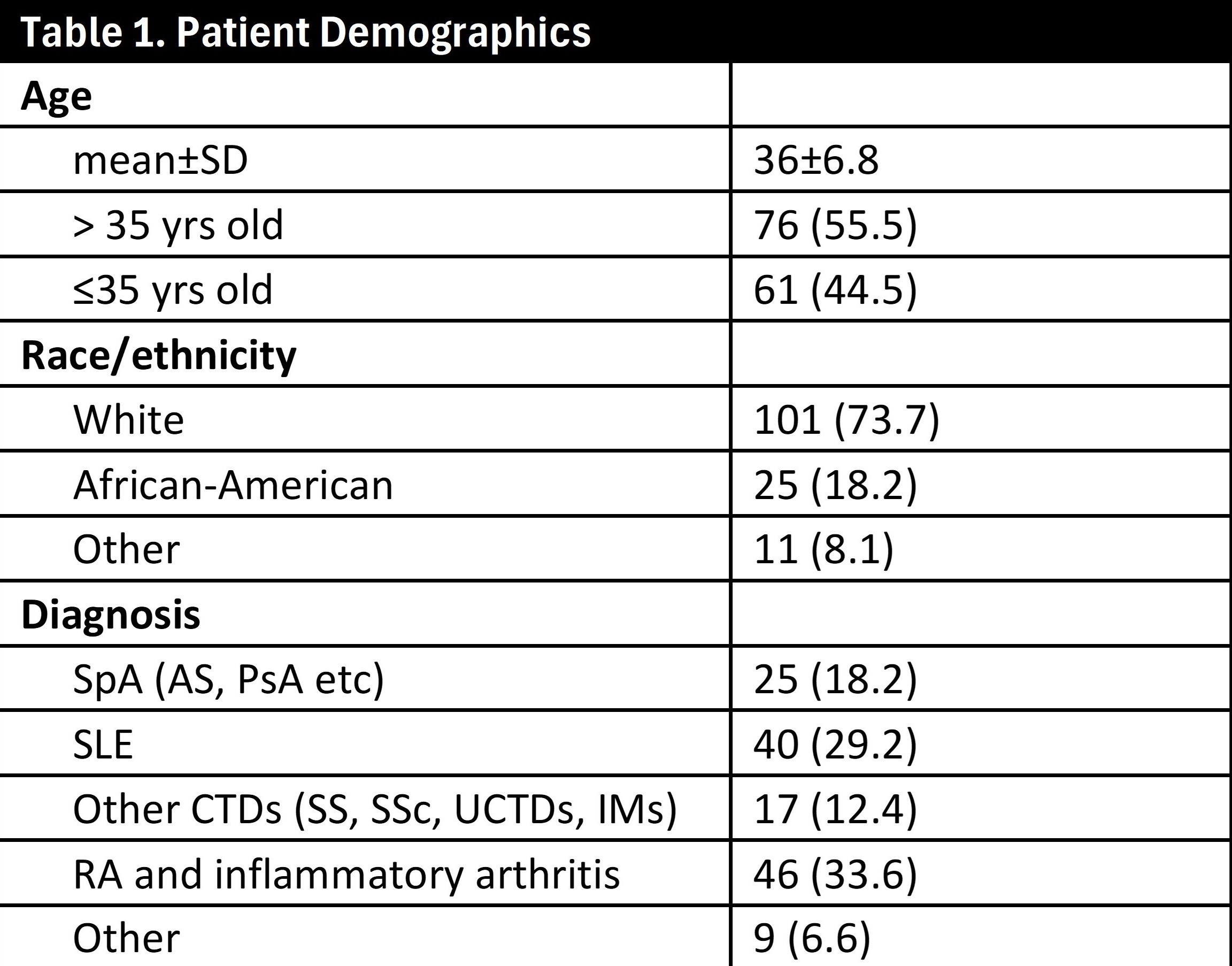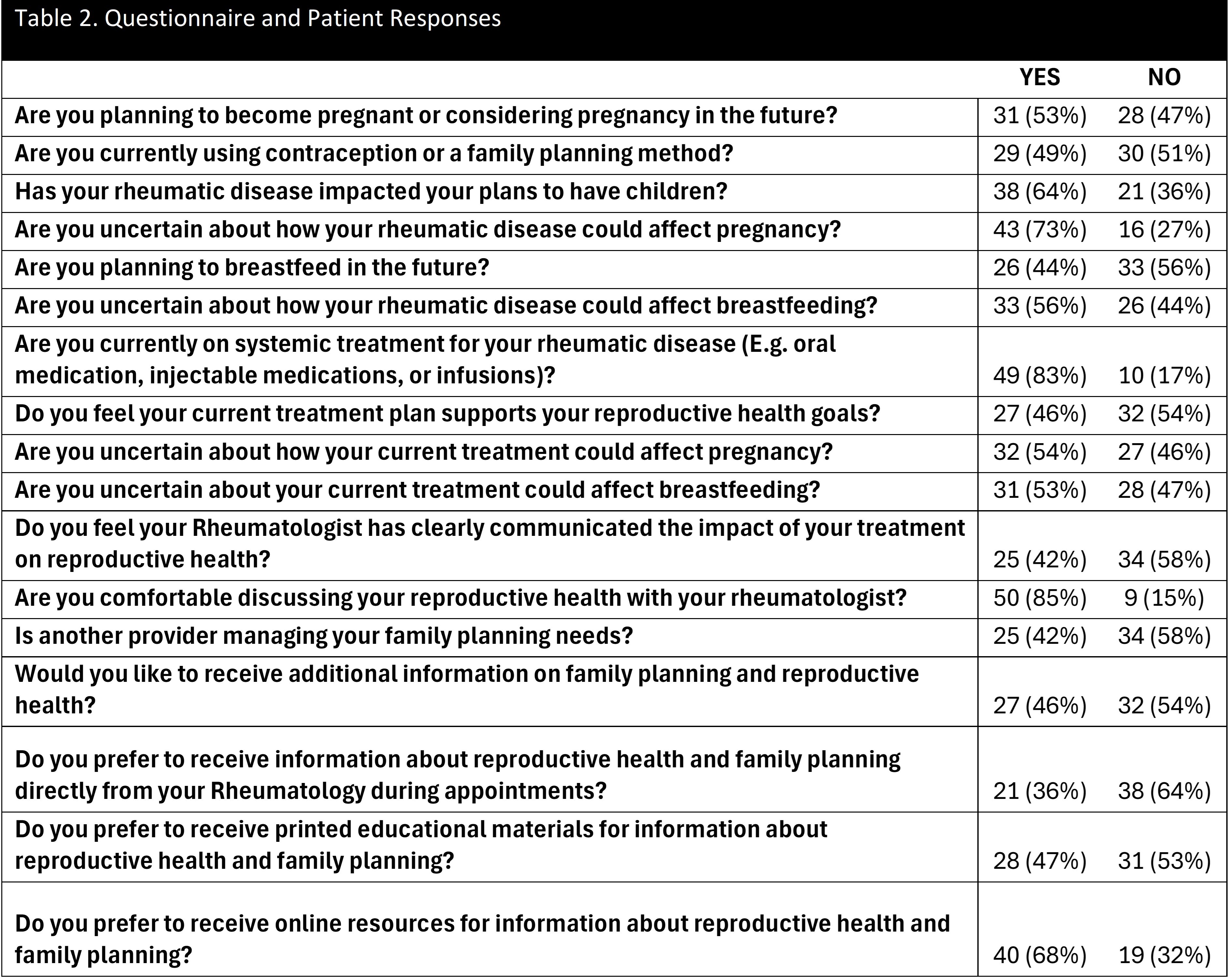Session Information
Session Type: Poster Session A
Session Time: 10:30AM-12:30PM
Background/Purpose: Reproductive-aged women are disproportionately affected by rheumatologic disorders, making family planning issues like contraception, pre-conception counseling, fertility, pregnancy complications, and postpartum care critical components of disease management.
Guidelines now offer a framework for Rheumatologists to navigate the challenges in treating female patients of reproductive age. However, barriers to initiating conversations about sexual and reproductive health (SRH) remain. Patients may feel uncomfortable initiating these conversations or are unaware of the potential risks they face, which restricts their ability to have an informed dialogue with providers.
Our study aims to understand how patients perceive the impact of their rheumatic disease and treatment on their SRH and to find areas for providers to improve communication and patient education and promote reproductive wellness.
Methods: In this survey study, we identified female subjects aged 18-45 years with autoimmune rheumatic diseases seen in the Rheumatology Department of our institution using Slicer Dicer, a data exploration tool in the EPIC EMR that allows for customized searches on large patient populations. We developed a questionnaire to prompt and facilitate reproductive health conversations (Table 2), which included 17 yes/no questions about patient comfort with SRH discussions, their conditions’ impact on family planning, pregnancy, and breastfeeding, and preferences for receiving related information. Patients responded through REDCap, a secure web application for building and managing online surveys and databases. We then performed a descriptive analysis to evaluate responses, calculating percentages and the mean and standard deviation for age. The study received IRB approval at our institution.
Results: 137 eligible patients received an online questionnaire. Table 1 summarizes general patient demographics. 59 of the 137 patients (43%) responded. Table 2 shows the responses. Almost 2/3 (64%) of respondents stated that their rheumatic disease affected their plans to have children. 73% of patients indicated they did not know whether their conditions could affect pregnancy, and more than half were uncertain about the effect of rheumatic disease on breastfeeding (56%). Regarding treatments, 54% of patients were unaware of the effect of their medications on pregnancy, and 53% were uncertain of medication effects on breastfeeding. Interestingly, more patients preferred to receive online resources for information about their diseases and RH (68%) than directly from their physicians (36%) or printed materials (47%).
Conclusion: Our survey indicates that a significant proportion of respondents are impacted by rheumatic disease in their family planning and pregnancy decisions. Results also reveal gaps in reproductive health knowledge among our female patients and underscore the need for improved communication with healthcare providers. The preference for online resources indicates a shift towards digital information dissemination, suggesting the potential for online educational materials to increase patient engagement and help tailor management.
To cite this abstract in AMA style:
Topalsky K, Frumker L, Shamim M, Pamuk O, Colucci J, Magrey M. Reproductive Health Needs of Women with Rheumatic Disease: An EMR-Based Online Survey Study [abstract]. Arthritis Rheumatol. 2024; 76 (suppl 9). https://acrabstracts.org/abstract/reproductive-health-needs-of-women-with-rheumatic-disease-an-emr-based-online-survey-study/. Accessed .« Back to ACR Convergence 2024
ACR Meeting Abstracts - https://acrabstracts.org/abstract/reproductive-health-needs-of-women-with-rheumatic-disease-an-emr-based-online-survey-study/


